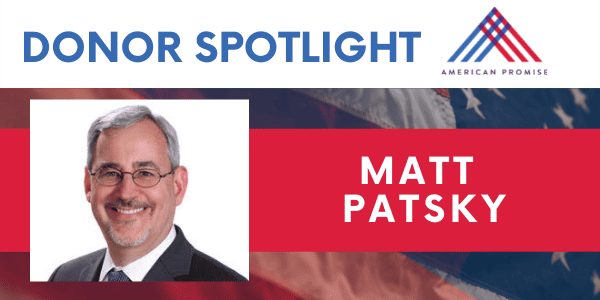Within the American Promise community, we find a diversity of perspectives that parallels our nation’s many differing viewpoints. Here we have taken a few minutes to speak with some of the investors, leaders, and partners in this movement to discuss interests, learn about occupations and preoccupations, uncover current and historical heroes, and find common ground around a shared commitment to the American Promise mission.
What is your occupation?
I am the CEO of Trillium Asset Management, a wealth-management firm.
Your preoccupation?
While I have concerns about political contributions and the impact we’re having on money in politics, it all stems from deep concerns about all of the other problems it’s causing — inequities, both racial and gender, that aren’t getting solved because of the pollution of money in politics. I think we’ve spent a lot of time working on those systematic problems and trying to figure out, how do you address them? How do you break down those systems and correct them?
And the reality is, money in politics always comes up as being in the way of why we don’t ever end up dealing with any of this. Why aren’t we addressing one of the biggest threats to humankind, climate change? Money. Why aren’t we addressing gender inequity? Money. And it’s on and on and on, and as long as we have politicians who can be bought by the highest bidder, we’re screwed.
The only thing that keeps me going is that there are groups like American Promise who are working on it, and I think hopefully we’ll make it, but it’s a long process to correct structural problems.
What is your current state of mind?
I am an eternal optimist. I am hopeful that some of these big issues will be addressed, and I have told friends and family that I am confident we can fix most of these problems, though it may take time, and that we will live in a nation with more equity. In order for a democracy to function you need to make people feel they are all participating to some degree, and there needs to be a common starting point of taking care of people who have the least.
We’re all hopeful, but social media combined with the ending of the Fairness Doctrine gave media the ability to go ahead and put out propaganda that you know to be completely false. There is absolutely no accountability.
It’s all being influenced by money in politics, because it’s how we maintain the status quo. I have never been followed around a store by a security guard. My husband Jun gets followed all the time. He was hit by a car, and the first question asked of him by the Boston police while he was lying in the street bleeding profusely was if they could have his social security number, because they were running a background check with ICE to see if he was legally in the United States.
It’s all interconnected. There is so much intersectionality of all these issues. The healthcare system is broken, the criminal justice system is broken, and there are moneyed interests that want to keep them broken.
What are you reading/watching now?
Generally speaking, my go-tos for information are The New York Times, The Economist, and The Wall Street Journal. I do occasionally read Barron’s, and I watch NBC Nightly News every night. Certainly, I am reading the news online, but I also now know there is bad information on the internet from both sides.
Which living person do you most admire?
Jimmy Carter. Because that was all heart, and when you see what he has done after his presidency, God Bless him. He has dedicated his life to making the world a better place. What people don’t remember is that he understood that climate change is one of the most existential threats to the planet and proposed a $.50/gallon gas tax in 1977 to try to get us off of dependency on liquid fuels. Think about that now, looking at where we are. He had a lot of great ideas. He was an incredibly sharp man who was not as well-equipped to deal with the politics of Washington D.C.
Which historical figure(s) do you most identify with?
Mahatma Gandhi. I don’t know if I see myself as Mahatma Gandhi, that’s a little strong, but he is somebody who I admire for having changed history peacefully. And I actually do have, hanging right over my desk his quote, “the earth has enough for everyone’s need, but not enough for everyone’s greed,” just to remind myself what the source of the central cause of our global challenges is. The earth does have enough for all of us.
What drew you to American Promise?
We had been doing work on campaign finance reform long before Citizens United. The decision of Citizens United and the aftermath just left everybody thinking that we need to do more.
Trillium, now for forty years, has advocated for getting money out of politics and asked companies to commit to not contributing to political campaigns, to not put money into politics. It unfortunately hasn’t been one of Trillium’s most successful campaigns. But this is a very long-term effort, and we have had some successes. We continue to believe that we will win on this issue in time.





